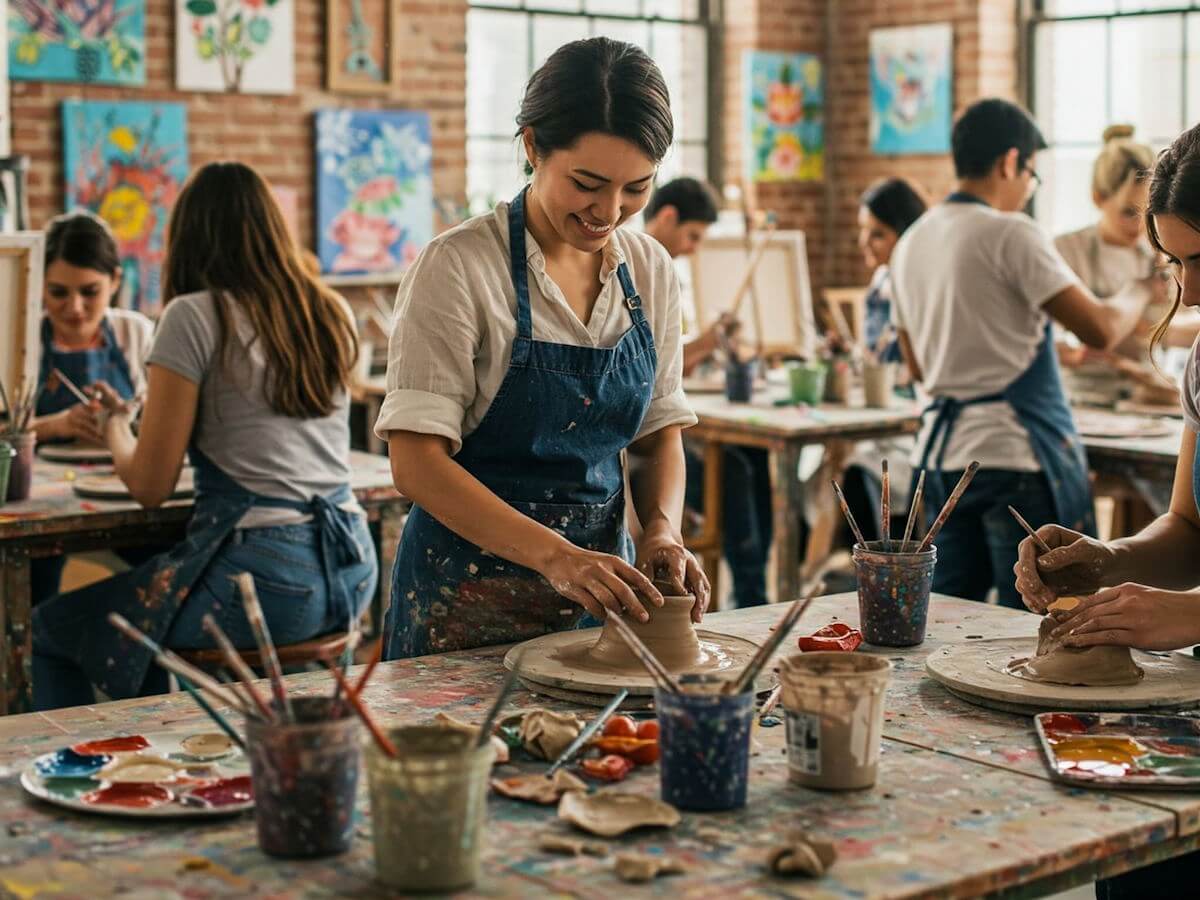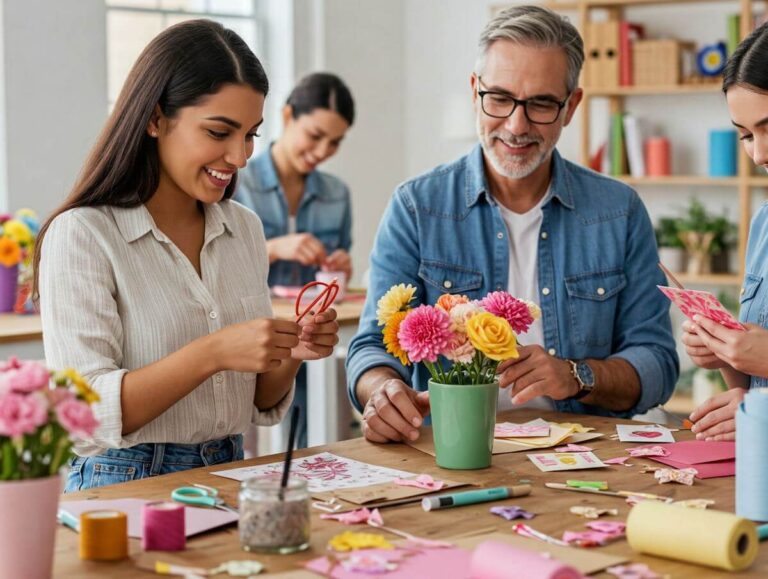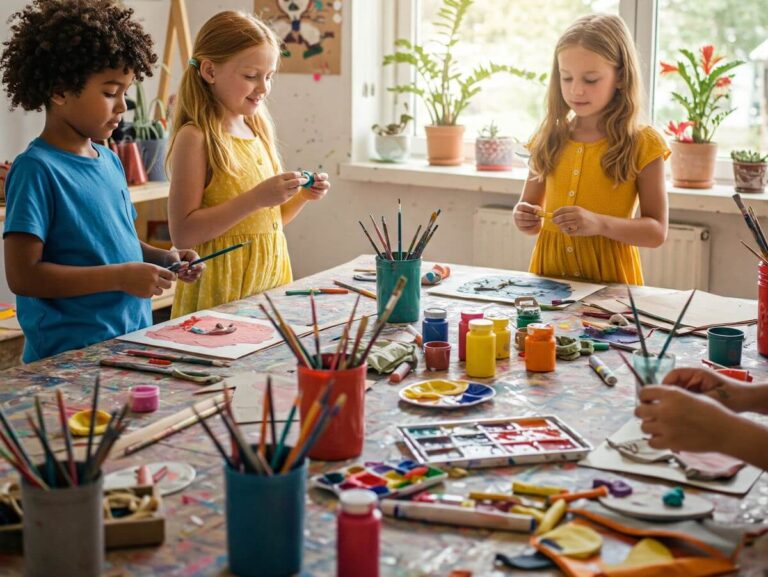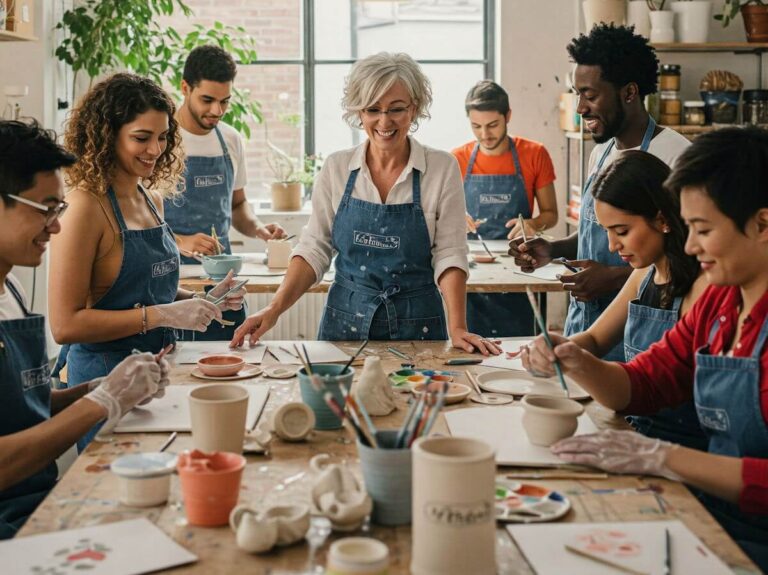Art workshops have emerged as valuable platforms that facilitate creative expression and community engagement. These workshops typically gather individuals with varying levels of artistic experience to explore different forms of art, ranging from painting and sculpture to photography and mixed media. By providing a structured environment, art workshops encourage participants to engage with their creativity while receiving guidance from experienced instructors or facilitators.
Most art workshops are designed to be inclusive, catering to not only professionals but also beginners who wish to delve into the world of art. The typical structure of an art workshop includes a mix of instruction, hands-on work, and opportunities for feedback and discussion. Participants often start with demonstrations or lectures that introduce techniques and concepts, followed by hands-on practice where they can apply what they have learned. This format not only promotes skill development but also fosters a sense of community among participants, as they share their artistic journeys and inspirations.
In recent years, the prevalence of art workshops has significantly increased in various settings, including community centers, schools, and private studios. These workshops serve numerous purposes: they can be educational, recreational, or therapeutic. They offer unique opportunities for people to connect with their inner selves and explore their creativity, addressing mental wellness and personal growth. As communities recognize the importance of art in building connections and enhancing quality of life, the availability and diversity of art workshops continue to expand. The various formats of these workshops—whether single-session classes or extended series—allow for tailored experiences, catering to the specific interests of participants. Ultimately, art workshops not only ignite creativity but also foster connections among individuals who may otherwise never cross paths.
The Role of Connection in Art
Art has long been regarded as a universal language, transcending cultural and linguistic barriers to foster meaningful connections among individuals. In art workshops, this intrinsic quality becomes especially potent, enabling participants to engage in shared creative experiences that promote emotional and psychological well-being. When individuals come together to create, they harness the power of collaboration, which often leads to the formation of new friendships and alliances. The act of creating art in a communal environment allows for the exchange of ideas, thoughts, and feelings, deepening participants’ understanding of one another.
One of the significant emotional benefits of participating in art workshops is the cultivation of empathy. As individuals share their personal stories and artistic expressions, they are given the opportunity to see the world through the eyes of others. This shared experience cultivates a sense of belonging and acceptance, allowing participants to feel connected despite their diverse backgrounds. Engaging in art-making with others can illuminate various life experiences and perspectives, thereby enriching participants’ emotional intelligence and fostering a greater appreciation for diversity.
Moreover, the process of creating art together can lead to a sense of accomplishment, reinforcing connections between participants. Collaborative projects often require communication, negotiation, and problem-solving skills, further enhancing the relationship among those involved. As individuals work towards a common goal, they develop trust and camaraderie, which can extend beyond the confines of the workshop. Ultimately, art workshops serve as a platform not only for self-expression but also for nurturing collective connections, allowing participants to build lasting relationships through their shared journey in creativity.
Creativity as a Catalyst
Creativity plays a pivotal role in both personal development and community building, as it serves as a powerful catalyst for transformation and connection. Engaging in art workshops allows individuals to explore their creative potential, which can lead to profound personal insights and growth. By participating in these workshops, individuals can break free from conventional thinking patterns and unleash their imaginations, which is essential for effective problem-solving and innovative thinking.
One of the significant benefits of art workshops is their ability to enhance creative thinking among participants. Through various artistic mediums, such as painting, sculpture, or digital art, individuals are encouraged to express themselves freely, fostering a sense of exploration and experimentation. This creative process helps participants develop critical thinking skills as they learn to navigate challenges and make decisions in real-time, skills that are crucial not only in artistic endeavors but also in everyday life.
Art workshops also provide a supportive environment that can help individuals unlock hidden talents. Many people may not recognize their artistic abilities until they experience encouragement from peers and mentors in a workshop setting. This nurturing atmosphere fosters collaboration and builds confidence, which further inspires participants to pursue their creative interests outside the workshop. As individuals cultivate their own talents, they contribute to the enrichment of their communities by sharing their newfound skills and insights with others.
Finally, the impact of creativity extends beyond the individual; it resonates throughout the community. By participating in art workshops, individuals become part of a larger network of creative thinkers and doers, fostering a sense of belonging and purpose. This collective creativity can lead to community-wide initiatives, collaborative projects, and a stronger sense of social ties, ultimately enriching both individual lives and the community at large.
Diverse Participants, Shared Experiences
Art workshops serve as a unique platform for fostering connections among individuals from varied backgrounds, age groups, and skill levels. One of the standout features of these workshops is their ability to attract a diverse array of participants. This inclusivity not only enhances the overall atmosphere but also enriches the artistic experience itself. Individuals ranging from children to seniors can come together, each bringing their own perspectives and insights into the creative process. This variety helps break down barriers, allowing participants to learn from one another and gain different viewpoints on art.
Moreover, art workshops often draw individuals from various cultural backgrounds. Each participant brings unique stories and traditions that influence their creative expression. For instance, a participant from a different cultural environment may introduce techniques or themes that are unfamiliar to others, prompting discussions that expand everyone’s understanding of art. This interaction fosters an invaluable exchange of ideas that can lead to collaborative projects, demonstrating how different backgrounds can merge into a single, enriching experience.
The workshops aim to create a safe and supportive space for self-expression. Participants are encouraged to share not only their artistic talents but also their personal stories, which often serve as the inspiration for their work. This communal sharing cultivates empathy and understanding, as attendees begin to recognize the common threads that link them through their differing experiences. Ultimately, the diverse nature of participants in art workshops amplifies creativity, resulting in a richer, more fulfilling experience for everyone involved. By embracing varied perspectives, these workshops empower individuals to explore innovative ideas and foster a deeper appreciation for art in all its forms.
Building Skills and Confidence
Art workshops represent an invaluable educational resource for individuals seeking to enhance their creative abilities while concurrently developing essential skills. These structured environments foster learning through hands-on experience and guided instruction, crucial for skill development in various artistic disciplines. As participants immerse themselves in the creative process, they engage in activities that stimulate cognitive and motor skills, facilitating both personal growth and artistic expression.
By providing access to different mediums and techniques, art workshops enable attendees to explore their artistic potential without fear of judgment. This supportive atmosphere encourages them to experiment with unfamiliar materials and concepts, ultimately leading to a broader understanding of the art-making process. As individuals progress through the workshops, they receive constructive feedback from peers and instructors alike, which further nurtures their learning experience and builds essential competencies.
The journey of acquiring new skills within these workshops can also significantly impact an individual’s self-esteem. As participants witness their own improvement and mastery of various techniques, they often experience a notable boost in confidence. This transformation empowers them to articulate their ideas and emotions more freely, promoting a sense of authenticity in their artistic endeavors. Such personal development can extend beyond the confines of the workshop, impacting various facets of participants’ lives by instilling resilience, creativity, and self-discovery.
Ultimately, art workshops serve as a vital platform for fostering both skill development and confidence. The combination of supportive guidance, hands-on practice, and positive reinforcement cultivates an enriching atmosphere where individuals can flourish artistically and personally. As participants emerge from these experiences with new skills and heightened self-assurance, they are more likely to pursue their creative passions with renewed vigor and enthusiasm.
Facilitators and Their Impact
In the realm of art workshops, the role of facilitators extends far beyond mere instruction. Effective art instructors possess a unique blend of skills and attributes that significantly influence the atmosphere and outcomes of the workshop experience. A key attribute of accomplished facilitators is emotional intelligence, which enables them to connect with participants on a personal level. This connection fosters an environment where individuals feel valued and understood, allowing for genuine exploration and expression through art.
Another vital skill is adaptability. Facilitators should be prepared to modify their approach based on the diverse needs and backgrounds of participants. This flexibility is essential in creating an inclusive atmosphere that encourages individuals to take creative risks without the fear of judgment. Furthermore, effective art instructors are adept in various artistic techniques, empowering them to provide guidance that is both informative and inspiring. Their breadth of knowledge not only enhances the participants’ learning experience but also instills confidence in their ability to produce art.
An essential aspect of a facilitator’s role is cultivating a sense of community among participants. By encouraging collaboration and dialogue, instructors can help participants feel more comfortable sharing their ideas and experiences. This interactive engagement promotes experimentation and growth, both artistically and personally. Moreover, facilitators can introduce group activities and discussions that allow for collective inspiration, further enhancing the creative journey of individuals within the workshop.
Ultimately, the effectiveness of art workshops largely hinges on the skills and attributes of facilitators. Their ability to create a safe, engaging, and inclusive environment is paramount in fostering an atmosphere conducive to exploration and connection. By embracing these qualities, art instructors can significantly elevate the workshop experience, empowering participants to harness their creativity fully.
Real-Life Success Stories
Art workshops have proven to be a transformative experience for many individuals, leading to both personal growth and community connection. For instance, Sarah, a participant from a recent community art workshop, found solace and inspiration within a group of diverse individuals. She recounts how, initially hesitant, she soon discovered a supportive environment that encouraged her creative expression. “For the first time in years, I felt free to explore my ideas. The camaraderie of the group pushed me to step outside my comfort zone,” she shared. Sarah’s newfound confidence not only enhanced her artistic skills but also allowed her to form lasting friendships, illustrating how art can break down barriers and foster connection.
Another compelling account comes from David, who attended a workshop focusing on painting techniques. He explained how the experience allowed him to cope with grief after losing a loved one. “I didn’t expect to heal, but being surrounded by others who were also finding their creative voice was unbelievably therapeutic,” he stated. David went on to create a series of paintings that expressed his emotions, which he later showcased at a local exhibit. His story exemplifies how art workshops can serve as a powerful outlet for those navigating difficult emotions, facilitating both personal healing and community engagement.
Moreover, the impact of these workshops extends to larger neighborhoods. A community art workshop hosted in a previously underserved area led to the creation of a mural that now embodies the stories of the residents. Participants shared their experiences and collaborated on the design, thus transforming the physical space while fostering a sense of belonging. This initiative showcased how art can unify individuals and connect them to their surroundings, emphasizing the potential of workshops to enhance community spirit.
Creating Lasting Community Connections
Art workshops serve as a powerful catalyst for fostering long-term connections within communities. By bringing diverse individuals together, these workshops create a supportive environment where participants can explore their creativity while cultivating relationships. The bonds formed during the workshop often lead to collaborations that extend beyond the immediate experience, allowing for the formation of a vibrant artistic community.
One of the primary ways participants can continue their artistic journeys together is by establishing regular meetups or discussion groups. These gatherings provide an opportunity for like-minded individuals to not only share techniques and ideas but also to critique and help polish each other’s work. Continuing to cultivate this dialogue can enhance individual skills and deepen the sense of belonging within the community. Additionally, local libraries, community centers, or online platforms like social media can serve as hubs for these connections, making it easier for artists to stay in touch and collaborate on projects.
In many cases, art workshops inspire participants to embark on community art projects that encourage ongoing collaboration and interaction. These projects may include mural paintings, collaborative sculptures, or community exhibitions that allow individuals to showcase their collective talents. Such initiatives not only enrich the community’s cultural landscape but also promote a sense of ownership and pride among participants. The process of working together towards a common artistic goal strengthens relationships and fosters a support network that celebrates each individual’s contributions.
Furthermore, by participating in community art projects, participants often find themselves engaging with a broader audience, which can ignite further interest in future workshops and events. This cycle of engagement reinforces the idea that art is not merely a solitary pursuit but a dynamic way of connecting with others. Through shared experiences and collaborative creations, art workshops can effectively create lasting community connections, ensuring that the impact of creativity resonates long after the workshop has concluded.
Conclusion and Call to Action
In summary, art workshops have proven to be vital environments for cultivating both connection and creativity. Through collaborative endeavors and shared artistic experiences, participants discover not only new skills but also deepen their understanding of one another. This fusion of diverse perspectives fosters a sense of community that transcends individual differences, ultimately leading to a richer and more vibrant creative culture.
Recent discussions around art workshops highlighted their unique ability to empower individuals, encouraging them to express themselves freely and authentically. The act of creating art together can be profoundly transformative, allowing participants to build new relationships and enhance their emotional well-being. Hence, engaging in these workshops serves not just as a means of artistic development, but also as a pathway to social connection and personal growth.
As we move forward, it is essential to consider how you can become involved in the art-making process. Whether you possess prior experience or are entirely new to the subject, the beauty of art workshops is their accessibility. We invite you to explore local offerings in your community or take the initiative to organize a workshop yourself. By doing so, you can contribute to an enriching cultural exchange that celebrates creativity and collective expression.
Engaging in an art workshop may provide you with a renewed sense of inspiration and joy. So take the leap, gather friends, family, or colleagues, and embark on this artistic journey together. The shared joy inherent in creating art can lead to remarkable connections and memorable experiences that resonate far beyond the canvas.




